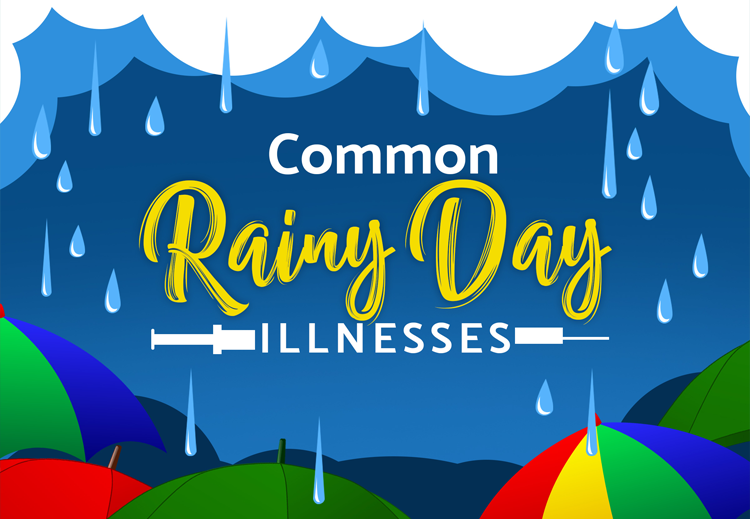
☰ Menu
Menu
July 17, 2020 | 4:30 pm

Rainy days are always fun to welcome, especially after experiencing a long period of summer. But along with the rains and change in temperature come something we certainly must avoid ushering in. What are those, you say? It’s the troublesome rainy-day illnesses. This season increases the transmission of water-borne diseases and increases the risk of catching diseases associated with cold and wet weather.
As in every season, personal hygiene, environmental sanitation, and resistance-building such as getting immunization shots against vaccine-preventable illnesses play vital roles in fighting off diseases.
Dengue is a viral infection transmitted through the bite of a dengue-carrying mosquito.
Signs and Symptoms:
The breeding ground for mosquitos increase during the rainy season because they breed on clear and stagnant water. Make sure to cover all containers that may hold water, clean areas where stagnant water gets stored, and use insect repellants.
Malaria can be transmitted through the bite of a mosquito infected with the Plasmodium parasite.
Signs and Symptoms:
As in preventing dengue, make sure to remove stagnant water from containers such as discarded tires, buckets, and cans that could potentially be breeding grounds for mosquitos. It is also recommended to check gutters to make sure that they are not clogged.
Leptospirosis comes from flood water, vegetation and moist soil contaminated with the urine of an animal, especially rats, infected with Leptospira bacteria.
Signs and Symptoms:
Avoid potentially contaminated water, wear protective clothing and footwear, and control rats in the household by using traps, pesticides, and by keeping your house clean.
Cholera is caused by the Vibrio cholerae bacteria found on food or water contaminated with human waste. It is transmitted when contaminated food or water is consumed.
Signs and Symptoms:
Only consume safe food and water, practice safe food and water handling and storing, practice proper hand washing and hand hygiene, and always keep the surroundings clean.
Hepatitis is transmitted through consuming food and water contaminated with human waste and urine of a person with Hepatitis A.
Signs and Symptoms:
Practice proper handwashing and hand hygiene, safe food and water handling and storing, and proper waste disposal.
Typhoid fever is caused by Salmonella typhi bacteria which are transmitted through consuming food and water contaminated with human waste.
Signs and Symptoms:
Practice proper handwashing and hand hygiene, safe food and water handling and storing, and proper waste disposal. Only consume safe food and water.
Influenza, commonly known as “flu”, is a contagious viral infection caused by an influenza virus which attacks the respiratory system (nose, throat and lungs). Symptoms usually manifest about 1 to 4 days after exposure to the virus. People who are already infected with the flu are most contagious in the first 3-4 days after their illness starts.
Signs and Symptoms:
The best way to prevent contracting this is to get a flu vaccine every year. Also, it is recommended to practice social distancing, proper cough and sneeze etiquette, and proper hand hygiene.
Some rainy-day illnesses can be prevented by getting vaccinations. Our Immunization Center offers influenza, pneumococcal, hepatitis, and typhoid vaccines.
Other vaccines available:
For inquiries, you may call the DLSUMC Immunization Center at (046) 481-8000 or (02) 8988-3100 local 1344.
———————————————————————————————————————————————————-
Disclaimer:
All content found on the DLSUMC website, including text, graphics, images, audio or other formats were created for general informational purposes only and are not intended or implied to be substitutes for professional medical advice, diagnosis or treatment.
If you think you may have a medical emergency, call your doctor, go to the emergency department, or call your local emergency hotline immediately.
Other Health Articles